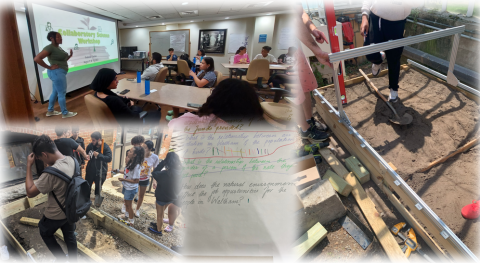Body
Image

Robotic Enhanced Restorative Justice Gardening
Our work engages high school youth in Massachusetts and Louisiana in transdisciplinary learning of computational science, artificial intelligence, engineering, and restorative ecologies through the installation of automated urban gardening robots that we are calling restorative gardens. These gardens offer an opportunity to bridge traditional gardening and 21st-century technological skills while fostering community engagement by supporting youth in using emerging technologies to address critical issues such as food security. Drawing upon an emancipatory community design and research approach, our work involves youth in participatory action research in which they use research methods to make sense of and address social problems of community food insecurity by building and programming restorative gardens in their local communities. We focus our recruitment on youth who have been historically excluded from STEM fields and youth who do not have a particular interest in STEM. As such, a key aspect of our work is the longitudinal research of student identity and interest development. This is similar to our prior work where we have been tracking the impact of participation in our programs over two to three years.
Pillar 1: Innovative Use of Technologies in Learning and Teaching
In partnership with the company Farmbot we are utilizing an AI enhanced, modularized gardening robot, the farm.bot. The farm.bot is an open sourced, computer numerical control (CNC), automated farming robot that has an easy-to-program API interface that allows the programming of the camera to engage the machine in automatic weeding, watering, and monitoring environmental conditions such as soil moisture, air temperature, and relative humidity.
Pillar 2: Partnerships for Career and Workforce Preparation.
We draw upon Boston College’s Tools for Tomorrow curriculum which fosters career- and self-exploration, including identifying goals, resources, and barriers to careers and fostering flexibility to navigate barriers and adapt to change as needed in a rapidly changing work context. Youth examine how STEM skills are central in the attainment of rewarding and meaningful potential STEM and non-STEM careers, as well as in meeting the goals of helping their communities
Pillar 3: Strategies for Equity in STEM Education
Drawing upon an emancipatory community design and research approach, our work involves youth in participatory action research in which young people use research methods to make sense of and address social problems of community food insecurity by building and programming restorative gardens in their local communities. The restorative gardens offer multiple entry points and pathways for motivating and engaging youth who have different interests and are from different backgrounds and experiences in STEM.

Discipline(s)
Emerging Tech (Artificial Intelligence, Quantum Computing, and Blockchain)
Interdisciplinary
Target Gradespan(s)
High school (9-12)
Target Participant(s)
Youth / students
Project Setting(s)
Informal Education
Category
Developing and Testing Innovations (DTI)